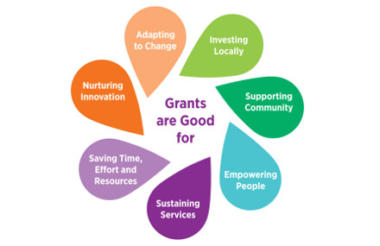Kathy Evans makes the case for grants ahead of Local Charities Day.
The long-accepted wisdom in the sector – that the vast majority of charities are small, local and working tirelessly but almost invisibly to provide vital direct support to communities right where and when they need it most – is borne out by the statistics.
Small charities make up 80 per cent of the sector and almost all of these operate locally, with social services being the most common type of support provided. CAF reports that 98 per cent of households had used a charitable service in the previous month but a quarter of people didn’t realise it was a charity providing that service.
It’s no surprise that people’s reliance on local charities – especially younger people and single parents – is growing, as cuts to council budgets force them to close or merge children’s centres and youth clubs, central government policy threatens hospitals, libraries and post offices and benefit cuts drive even working households into poverty.
As it has for centuries, the local voluntary sector steps up to create human-centred solutions, perhaps in the form of a community crèche, a credit union or a food bank.
Do contracts work?
This week, Rob Wilson, minister for civil society, has recognised the essential role of small charities in delivering public services, announcing new initiatives to help them win contracts. These focus on driving collaboration and overcoming existing barriers - helping small charities behave more like large charities. But do we really want them to?
We’re failing to appreciate just what it is that local charities give their community if we demand that they adopt a model of scaling up, costing down and submitting to the rigidity of a contract – not to mention the threat to a small charity’s sustainability posed by the short terms of most government contracts.
If you’re in any doubt about the damage current commissioning practice is doing to smaller charities, just read last week’s report from Lloyds Bank Foundation – Commissioning in Crisis.
What would we lose?
What would we lose if we lost the ‘local’ in the charity sector? A local charity is an organic, empathic response to crisis in a community – the product of an interdependent ecosystem – and by nature develops according to the needs and experiences of those people it aims to serve, with no more – and often a lot less – resource and infrastructure than is strictly necessary.
A local charity sources the skills, ideas and expertise its beneficiaries need from the streets around them – including from those beneficiaries themselves – building an inherently positive and inclusive network of relationships.
A local charity rides the same rollercoaster as its community, whether that’s the double-edged prospects of devolution or the racial prejudice and social divisions seen after the EU referendum.
If we lost the ‘local’ in charities, expecting them to change, merge or worse still close (42 per cent are already having to use reserves), we as a society would lose the two-way connection to what is really happening in people’s lives – and people themselves would lose the most tailored, flexible network they have and which never loses sight of them as individuals.
Under pressure
But local charities are under severe financial pressure and, increasingly, the only option to alleviate this pressure while continuing to meet rising local demand is to compete with very different types of organisation for contracts that fail to appreciate their strengths on every level – from the design of the bidding process to the evaluation and sustainability of the work overall.
Heading towards 2020, communities are going to need the highly responsive capacity and commitment of local charities even more as central government funding is withdrawn and local authority provision shrinks still further.
Charities who understand the experiences and ambitions of local people, because they are created, run and supported by local people, will be essential in making sure devolution arrangements and Brexit strategies are democratic and humane.
Revitalise grantmaking
In this climate, it makes perfect sense for local authorities to revitalise their grantmaking to local charities. Grants are cheaper and more cost-effective than contracts and allow an organisation whose success is based on helping people on their own terms the flexibility to continue doing that.
Grants can allow outcomes to be measured in mutually agreeable ways, with learning, adaptation and practice sharing embedded sustainably into the process. In the uncertainty of the next four years, it would be madness not to nurture this cycle but to force our currently agile, holistic local charity sector into the straightjacket of contracting and counterproductive mechanisms like payment by results.
Yet government grants to charities have declined by 40 per cent since 2010, and smaller charities have been hit the hardest.
So on Local Charities Day, let’s not just celebrate local charities – let’s protect the funding that will stop them disappearing.
The Grants for Good campaign is founded on a passionate belief in the unique value of local charities. We hope public sector professionals, as well as voluntary sector colleagues, will join us in asking commissioners and the minister himself to protect and promote government grant-making to our brilliant local charities.
Kathy Evans is chief executive of Children England
Related articles











